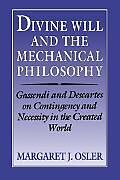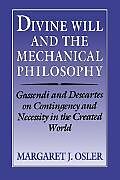Divine Will and the Mechanical Philosophy
Einband:
Fester Einband
EAN:
9780521461047
Untertitel:
Gassendi and Descartes on Contingency and Necessity in the Created World
Autor:
Margaret J. Osler
Herausgeber:
Cambridge University Press
Anzahl Seiten:
300
Erscheinungsdatum:
23.02.2016
ISBN:
0521461049
Klappentext
This book is about ways of understanding contingency and necessity in the world and how these ideas influenced the development of the mechanical philosophy in the seventeenth century. It examines the transformation of medieval ideas about God's relationship to the creation into seventeenth century ideas about matter and method as embodied in early articulations of the mechanical philosophy. Medieval thinkers were primarily concerned with the theological problem of God's relationship to the world he created. They discussed questions about necessity and contingency as related to divine power. By the seventeenth century, the focus had shifted to natural philosophy and the extent and certitude of human knowledge. Underlying theological assumptions continued to be reflected in the epistemological and metaphysical orientations incorporated into different versions of the mechanical philosophy. The differences between Pierre Gassendi's (1592-1655) and Rene Descartes' (1596-1650) versions of the mechanical philosophy directly reflected the differences in their theological presuppositions. Gassendi described a world utterly contingent on divine will. This contingency expressed itself in his conviction that empirical methods are the only way to acquire knowledge about the natural world and that the matter of which all physical things are composed possess some properties that can be known only empirically. Descartes, on the contrary, described a world in which God had embedded necessary relations, some of which enable us to have a priori knowledge of substantial parts of the natural world. The capacity for a priori knowledge extends to the nature of matter which, Descartes claimed to demonstrate, possess only geometrical properties. Gassendi's views can be traced back to the ideas of the fourteenth century nominalists, while Descartes can be linked to Thomist tradition he imbibed at La Fleche. Refracted through the prism of the mechanical philosophy, these theological conceptualizations of contingency and necessity in the world were mirrored in different styles of science that emerged in the second half of the seventeenth century.
Zusammenfassung
This book is about the varying influence of theological conceptions of contingency and necessity on two versions of the mechanical philosophy in the seventeenth century. Pierre Gassendi and René Descartes both believed that all natural phenomena could be explained in terms of matter and motion alone.
Inhalt
Part I. Theology and the Philosophy of Nature: 1. Divine power and divine will in the Middle Ages: historical and conceptual background; 2. Baptizing epicurean philosophy: Gassendi on divine will and the philosophy of nature; 3. Providence and human freedom in Christian epicureanism: Gassendi on fate, fortune and divination; 4. Theology, metaphysics, and epistemology: Gassendi's 'Science of Appearances'; 5. Eternal truths and the laws of nature; Part II. The Theological Foundations of Descartes' Philosophy of Nature: 6. Gassendi and Descartes in conflict; 7. Introduction: theories of matter and their epistemological connections; 8. Gassendi's atomism, an 'empirical' theory of matter; 9. Mathematizing nature: Descartes' geometrical theory of matter; 10. Conclusion: theology transformed and the emergence of styles of science.

Leider konnten wir für diesen Artikel keine Preise ermitteln ...
billigbuch.ch sucht jetzt für Sie die besten Angebote ...
Die aktuellen Verkaufspreise von 6 Onlineshops werden in Realtime abgefragt.
Sie können das gewünschte Produkt anschliessend direkt beim Anbieter Ihrer Wahl bestellen.
Loading...
Die aktuellen Verkaufspreise von 6 Onlineshops werden in Realtime abgefragt.
Sie können das gewünschte Produkt anschliessend direkt beim Anbieter Ihrer Wahl bestellen.
| # | Onlineshop | Preis CHF | Versand CHF | Total CHF | ||
|---|---|---|---|---|---|---|
| 1 | Seller | 0.00 | 0.00 | 0.00 |
